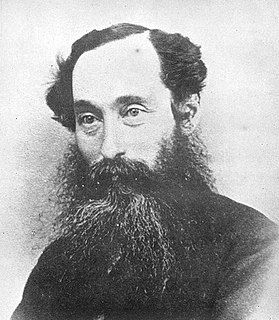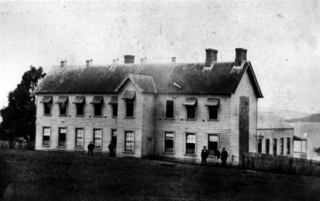
Sir Julius Vogel was the eighth Premier of New Zealand. His administration is best remembered for the issuing of bonds to fund railway construction and other public works. He was the first Jewish prime minister of New Zealand. Historian Warwick R. Armstrong assesses Vogel's strengths and weaknesses:
Vogel's politics were like his nature, imaginative – and occasionally brilliant – but reckless and speculative. He was an excellent policymaker but he needed a strong leader to restrain him....Yet Vogel had vision. He saw New Zealand as a potential 'Britain of the South Seas', strong both in agriculture and in industry, and inhabited by a large and flourishing population.

Sir Harry Albert Atkinson served as the tenth Premier of New Zealand on four separate occasions in the late 19th century, and was Colonial Treasurer for a total of ten years. He was responsible for guiding the country during a time of economic depression, and was known as a cautious and prudent manager of government finances, though distrusted for some radical policies such as his 1882 National Insurance (welfare) scheme and leasehold land schemes. He also participated in the formation of voluntary military units to fight in the New Zealand Wars, and was noted for his strong belief in the need for seizure of Māori land.

Sir Edward Stafford served as the third Premier of New Zealand on three occasions in the mid 19th century. His total time in office is the longest of any leader without a political party. He is described as pragmatic, logical, and clear-sighted.

Sir Francis Dillon Bell was a New Zealand politician of the late 19th century. He served as New Zealand's third Minister of Finance, and later as its third Speaker of the House. The town of Bell Block near New Plymouth – on land Bell bought from the Puketapu iwi in 1849 – is named after him, as is Bell Street, Whanganui. Bell's son, Francis Henry Dillon Bell, became the first New Zealand born Prime Minister in 1925.

Sir Frederick Whitaker was an English-born New Zealand politician who served twice as the Prime Minister of New Zealand and six times as Attorney-General.

The New Zealand general election of 1887 was held on 26 September to elect 95 MPs to the tenth session of the New Zealand Parliament. The Māori vote was held on 7 September. 175,410 votes were cast. In 5 seats there was only one candidate.
The following lists events that happened during 1856 in New Zealand.
The Colonial Secretary of New Zealand was an office established in 1840 and abolished in 1907. The office was similar to Colonial Secretaries found elsewhere in the British Empire.
The third New Zealand Parliament was a term of the Parliament of New Zealand. Elections for this term were held between 12 December 1860 and 28 March 1861 in 43 electorates to elect 53 MPs. Two electorates were added to this during this term, Gold Fields District and a new Dunedin electorate created by splitting the existing City of Dunedin into Dunedin and Suburbs North and Dunedin and Suburbs South, increasing the number of MPs to 57. During the term of this Parliament, six Ministries were in power.
The fifth New Zealand Parliament was a term of the New Zealand Parliament.

The Town of Christchurch by-election in 1860 was triggered by the resignation of Richard Packer as the Member of the House of Representatives for the Town of Christchurch electorate, and occurred during the term of the 2nd New Zealand Parliament. The previous representative of the electorate, the politician Henry Sewell, had returned after three years in England and the general expectation was that Sewell would be the sole contender for election. The Lyttelton Times wrote several provocative editorials, generally endorsing Sewell for his obvious ability, but criticising him for not publicly talking about his policies and plans. Sewell eventually arranged a public meeting the evening prior to nomination day; this was the only public meeting during the election campaign. After a lengthy address, which was favourably received by the Lyttelton Times, a second contender for the office put his name forward at that meeting: the publican Michael Hart. Sewell, a former premier and one of New Zealand's most senior politicians at the time, was successful against the political novice Hart.
Dr Ralph Richardson (1812–1897/1898) was a Member of the New Zealand Legislative Council. He lived in New Zealand for less than a decade, and retired to Devon in England, and later to London.

The Colony of New Zealand was a British colony that existed in New Zealand from 1841 to 1907, created as a Crown colony. The power of the British Government was vested in a governor, but the colony was granted self-government in 1852. The 1852 Constitution was inaugurated after the first parliament was elected in 1853, and the first government of New Zealand was formed in 1856. The Colony of New Zealand had three capitals: Old Russell (1841), Auckland (1841–1865), and Wellington. In 1907, the colony became the Dominion of New Zealand with a more explicit recognition of self-government within the British Empire.

The 1865 Town of New Plymouth by-election was a by-election held in the Town of New Plymouth electorate during the 3rd New Zealand Parliament, on 19 May 1865. The by-election was caused by the resignation of the incumbent, Charles Brown, and was won unopposed by Henry Sewell. Whilst Sewell was not a local resident, he was a member of the government through his appointment to the Legislative Council, the upper house of Parliament. Sewell accepted the invitation to represent the electorate, as him becoming a member of the lower house was seen to strengthen the government.

The General Assembly House, colloquially called Shedifice by the members of parliament, was the first house of the New Zealand Parliament in Auckland. It was in use by Parliament from 1854 until 1864 during the time that Auckland was the capital of New Zealand. It was also used by the Auckland Provincial Council, with Auckland Province owning the building from 1858. After the abolition of the provincial government system, the building was used by government's survey department and was then used by Auckland University College. The General Assembly House was demolished in 1917 to make way for Anzac Avenue. Today, a reserve adjacent to Parliament Street commemorates the location where New Zealand Parliament met initially.















